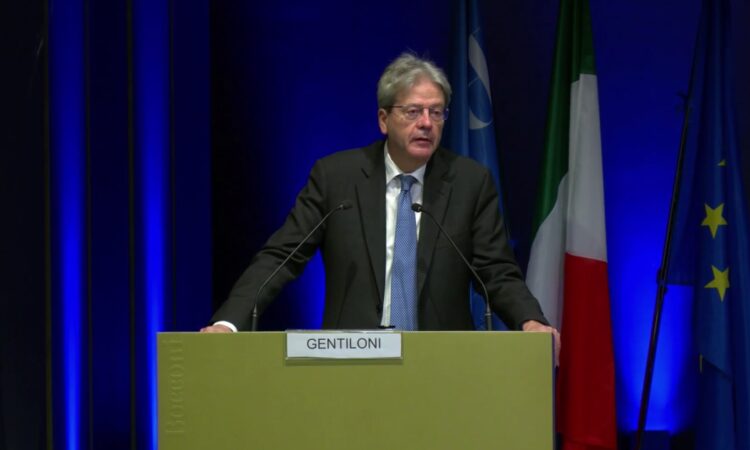ASVIS and ECCO call on Gentiloni for more climate transition investments for the benefit of all

Rome – European Commissioner for Economic and Monetary Affairs Paolo Gentiloni today opened the “Europe’s Future: Investing in the Climate Transition for All” event organized by ECCO, the Italian climate think tank, and the Italian Alliance for Sustainable Development (ASviS) as part of the 2024 Festival of Sustainable Development.
What emerged from the meeting was the need to stimulate a rapid increase in transition investment to address the risk of climate change driving unmanageable social impacts, damaging the stock of capital, and affecting most economic activities. Boosting investment in the energy transition would, at the same time, open up a once-in-a-lifetime opportunity to accelerate innovation for a broad and systemic transformation of global value chains. This would activate functional economies of scale to lower prices, making zero-emission goods and services accessible to a large majority of the population, with benefits in reducing inequality and poverty.
In his opening keynote speech, Gentiloni said that “last year, emissions in the European Union dropped by 15.5 percent compared to 2022, thanks in part to the Green Deal policies and the resources put in place with NextGenerationEU. An achievement that should encourage us to look even harder at the emission reduction targets for 2030 and beyond, without forgetting the criteria of equity and solidarity for a transition that is, precisely, for the benefit of all.”
To scale up climate action, ECCO and ASviS called for greater international coordination and for the design of a new system of economic governance aimed at pursuing more equitable outcomes, stressing the difficulties associated with the worsening geopolitical environment shaped by old and new conflicts, strategic confrontation between the United States and China, and growing distrust between the West and the Global South. They also reiterated that being successful requires distributing the benefits of climate investments more evenly worldwide, reversing the current situation in which emerging economies are seeking productive investments while many debt-stressed countries suffer from limited fiscal space.
Luca Bergamaschi, Director and Co-founder of ECCO pointed out that “the climate challenge has become a technological and competitiveness challenge that we cannot escape, risk of international marginalization and economic and social impoverishment. Italy and Europe must invest a great deal, first and foremost at home. However, with the current Stability and Growth Pact, individual countries, and all the more so Italy, will have very little fiscal space. The financial and legal way out already exists: to give continuity to the Next Generation EU experience, which gave birth to the NRRP, through a dedicated Climate and Energy Fund until 2050.”
Climate investments represent a major source of long-term competitive advantage. It is critically important that the issue is at the center of the political debate ahead of the European elections and the G7 summit in June, as proposed in the ASviS Report “Scenarios for Italy to 2030 and 2050. Choices to be made now for sustainable development,” presented in Ivrea at the opening of the Sustainable Development Festival.
“The ASviS Report clearly indicates that Italy must seize the energy transition as an opportunity to innovate across the board. Those who want to postpone the transition in the name of costs in the coming years to achieve it later actually aim to unload on the weakest and future generations the damage of inaction,”” said ASviS Scientific Director Enrico Giovannini.
The European Union has adopted ambitious climate goals. Following the Covid-19 pandemic and the Russian invasion of Ukraine, the EU has mobilized significant public money to respond to these shocks and promote green recovery through Next Generation EU (NGEU). However, crucial strategic issues remain to be defined, such as the completion of the banking and capital market union.
Gelsomina Vigliotti, Vice-President of the European Investment Bank (EIB), emphasized that her institution, “the European Union’s climate bank, with its financial and technical commitment, catalyzes private and public investment in projects that generate tangible impact on the environment and society, helping build a greener and more resilient future for future generations.”
English version by the Translation Service of Withub






